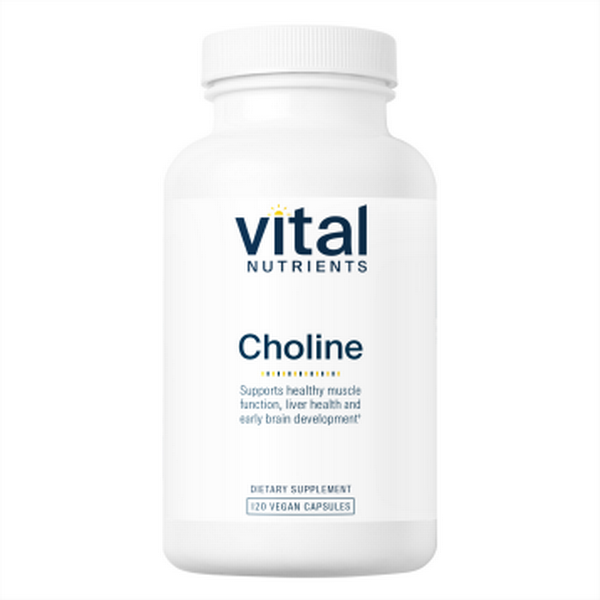The Benefits of Choline During Pregnancy
A Vital Nutrient for Mother and Baby
By Jane Gregorie - June 16, 2024
Pregnancy is a critical period where maternal nutrition significantly impacts the health and development of the baby. While many are familiar with the importance of nutrients like folic acid and iron during pregnancy, choline is an essential but often overlooked nutrient that plays a crucial role in fetal development. In this blog post, we'll explore the benefits of choline during pregnancy and provide research-backed insights into why this nutrient should not be neglected.
We recommend that all our pregnant patients take at least 450-550mg of extra Choline in pregnancy and during breastfeeding. I got obsessed with Choline after reading Hidden Valley Road, the book that has now been turned into a Netflix docu-series Six Schizophrenic Brothers, about the Galvin family from Colorado Springs. In the book, it detailed the importance of Choline in reducing the expression of the mutation this family shared and how it also affects placental health. Since we have seen so many older women who have experienced pre-eclampsia, it made me look further into choline as a possible preventative treatment for pre-eclampsia and the research I found, especially this NIH Study, seems to bear that out: https://www.ncbi.nlm.nih.gov/pmc/articles/PMC6722688/
What is Choline?
Choline is a water-soluble nutrient that is often grouped with the B vitamins. It is essential for various bodily functions, including the synthesis of phospholipids (critical components of cell membranes), neurotransmitter synthesis (important for brain function), and methylation processes (vital for gene expression). The body can produce some choline, but not in sufficient amounts, making dietary intake crucial.
Five Benefits of Choline During Pregnancy
1. Brain Development and Cognitive Function
One of the most significant benefits of choline during pregnancy is its role in fetal brain development. Research has shown that adequate choline intake is crucial for the development of the hippocampus, the brain region responsible for memory and learning. A study conducted by Caudill et al. (2018) found that higher maternal choline intake during the third trimester was associated with improved cognitive function in infants at 7 and 13 months of age .
2. Prevention of Neural Tube Defects
Choline is vital for neural tube closure during early fetal development, which occurs within the first few weeks of pregnancy. Neural tube defects (NTDs), such as spina bifida, are serious birth defects that affect the spine and brain. Adequate choline intake has been linked to a reduced risk of NTDs. A study published in the American Journal of Epidemiology indicated that women with higher choline intake had a significantly lower risk of giving birth to babies with NTDs .
3. Liver Health
During pregnancy, the liver plays a crucial role in metabolizing nutrients and maintaining overall health. Choline deficiency can lead to liver dysfunction, including fatty liver disease. Ensuring adequate choline intake helps support liver health and function, which is vital for both the mother and the developing fetus .
4. Placental Function
The placenta is the lifeline between mother and baby, facilitating nutrient and oxygen exchange. Choline contributes to the structural integrity of cell membranes and is essential for the formation and function of the placenta. Proper placental function is crucial for a healthy pregnancy and fetal development .
5. Reduced Risk of Preterm Birth
Emerging research suggests that choline may help reduce the risk of preterm birth. A study by Zeisel (2013) found that higher choline intake during pregnancy was associated with a lower incidence of preterm births. This finding highlights the importance of choline in supporting full-term pregnancies and reducing complications associated with prematurity .
Dietary Sources of Choline
The recommended adequate intake (AI) of choline for pregnant women is 450 mg per day. However, many pregnant women do not meet this requirement through diet alone. Foods rich in choline include:
- Eggs: One large egg contains about 147 mg of choline.
- Meat and Poultry: Beef liver, chicken, and turkey are excellent sources.
- Fish: Salmon and cod provide substantial amounts of choline.
- Dairy Products: Milk and yogurt contain moderate amounts of choline.
- Legumes and Nuts: Peanuts and soybeans are plant-based sources of choline.
Choline is a critical nutrient for pregnant women, contributing to the healthy development of the baby’s brain, preventing neural tube defects, supporting liver and placental function, and potentially reducing the risk of preterm birth. Despite its importance, many pregnant women may not be getting enough choline through their diets. Therefore, it is essential to be mindful of choline intake and consider dietary adjustments or supplements if necessary. We recommend 450-550 mg per day with food and keep Choline in stock for all of our pregnant and breastfeeding clients.
Ensuring adequate choline intake during pregnancy can have long-lasting benefits for both mother and child, making it a key nutrient for a healthy pregnancy.
References:
1. Caudill, M. A., Strupp, B. J., Muscalu, L., Nevins, J. E. H., & Canfield, R. L. (2018). Maternal choline supplementation during the third trimester of pregnancy improves infant information processing speed: a randomized, double-blind, controlled feeding study. *The FASEB Journal*, 32(4), 2172-2180.
2. Shaw, G. M., Carmichael, S. L., Yang, W., Selvin, S., Schaffer, D. M., & Finnell, R. H. (2004). Choline and risk of neural tube defects in a folate-fortified population. *American Journal of Epidemiology*, 160(2), 102-109.
3. Zeisel, S. H. (2006). Choline: critical role during fetal development and dietary requirements in adults. *Annual Review of Nutrition*, 26, 229-250.
4. Best, K. P., Gold, M., & Kennedy, D. (2016). Omega-3 long-chain polyunsaturated fatty acids for preventing preterm birth. *The Cochrane Database of Systematic Reviews*, (10).
5. Zeisel, S. H. (2013). Nutritional importance of choline for brain development. *Journal of the American College of Nutrition*, 22(4), 321-329.
